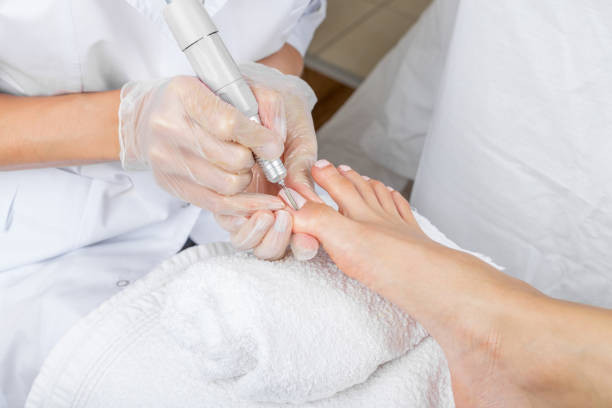Introduction In summer, heat and humidity create the perfect environment for foot problems and fungal infections. This article explains common summer foot issues, prevention techniques for athlete’s foot and toenail fungus, and how custom orthotics and proper footwear help. Expert podiatric advice from Carolina Foot & Ankle Specialists in Florence, SC, is provided to keep your feet healthy during summer activities.
What Are the Common Summer Foot Problems and Risks of Fungal Infections?
Summer weather increases moisture in shoes, making them ideal for fungal growth. Excessive sweating in hot conditions can lead to athlete’s foot and toenail fungus, especially in individuals with diabetes or naturally sweaty feet. Prolonged exposure to heat and humidity can cause itching, burning, cracking, and peeling, which may disrupt daily activities if not addressed promptly.
How Does Summer Weather Increase Athlete’s Foot and Toenail Fungus?
Hot, humid conditions lead to excessive sweating that traps moisture in shoes and socks, weakening the skin’s barrier. Public areas like locker rooms and pools further expose feet to fungal spores, resulting in persistent itching, redness, and skin peeling throughout the summer.
What Are the Symptoms of Athlete’s Foot and Toenail Fungus?
Athlete’s foot typically causes intense itching, burning, scaly skin between toes, blisters, and redness. Toenail fungus results in thickened, discolored, brittle, and crumbling nails with possible foul odors. Early recognition of these symptoms is crucial to prevent worsening and additional complications.
Why Is Early Prevention Important for Summer Foot Health?
Early prevention minimizes discomfort and stops minor infections from becoming chronic. Regular cleaning, thorough drying, and using antifungal powders help protect the skin’s barrier and prevent the spread of infection during the humid summer months.
How Can You Prevent Athlete’s Foot During Summer Activities?
Preventing athlete’s foot involves controlling moisture and maintaining cleanliness. Dry your feet thoroughly after water exposure, use antifungal sprays or powders, and choose breathable footwear to allow proper air circulation and reduce sweat buildup.
What Causes Athlete’s Foot in Summer and How to Avoid It?
The combination of warm temperatures, confined footwear, and physical activity creates excellent conditions for fungal growth. Washing with antimicrobial soap, drying feet completely, and changing socks frequently—especially after exercise—can help prevent the infection.
Which Hygiene Practices Effectively Prevent Athlete’s Foot?
Wash your feet daily with a mild antifungal soap and dry them well, especially between the toes. It is also beneficial to change socks often and disinfect shoes regularly. Moisture-wicking socks, made from natural fibers like cotton, can further reduce moisture accumulation.
What Are the Best Summer Footwear Choices to Prevent Fungal Infections?
Opt for open-toed sandals or shoes made from breathable materials to allow air circulation and reduce moisture. Footwear with antimicrobial linings and moisture-wicking properties, along with a looser fit, helps keep feet dry and less prone to fungal infections.
How Do You Identify and Treat Toenail Fungus in Summer?
Toenail fungus may appear as discolored, thickened, and crumbly nails. Early detection is key to preventing spread and complications. Treatment can include over-the-counter antifungal creams, nail lacquers, or, in more severe cases, prescription medications. Regular check-ups are important, particularly for patients with diabetes.
What Are the Signs of Toenail Fungus to Watch For?
Watch for yellowed or brownish nails that become thick, brittle, and may emit a foul odor. As the condition worsens, the nail may detach, causing pain during movement.
What Treatment Options Are Available for Toenail Fungus?
Mild cases may be treated with OTC antifungal creams and nail lacquers, but persistent infections might require oral antifungal medications. Some patients also explore home remedies like tea tree oil, although these tend to offer only temporary relief. In some cases, podiatrists recommend chemical nail removal or laser therapy along with proper hygiene.
When Should You See a Podiatrist for Toenail Fungus in Florence, SC?
Consult a podiatrist if over-the-counter treatments do not work within a few weeks, if the infection worsens, or if significant pain occurs. Individuals with diabetes or compromised immune systems should seek professional care promptly.
How Can Custom Orthotics Support Summer Foot Health and Prevent Fungal Infections?
Custom orthotics help distribute pressure evenly across the foot, reducing callus, blister formation, and other issues that can invite fungal infections. They promote proper alignment and minimize friction, keeping the feet drier.
How Do Custom Orthotics Help Prevent Foot Problems in Summer?
By supporting the arch and cushioning pressure points, custom orthotics reduce stress that can lead to calluses or cracks—entry points for fungi. They improve gait patterns, which further reduces friction and heat buildup on the skin.
What Are the Advantages of Custom Orthotics for Summer Activities?
Custom orthotics are tailored to each patient’s biomechanics, providing optimal support and stability. They help reduce foot fatigue, improve performance in sports, and lower the risk of secondary infections caused by excessive sweating.
How Can You Get Fitted for Custom Orthotics at Carolina Foot & Ankle Specialists?
The fitting process at Carolina Foot & Ankle Specialists begins with an evaluation of your foot structure and gait analysis using advanced imaging. Once a precise mold is made, your custom orthotic is manufactured for long-lasting support. Scheduling an appointment is the first step towards improved foot comfort this summer.
What Are the Best Practices for Choosing Summer Footwear to Avoid Foot Problems?
Choose summer footwear that offers support, ventilation, and moisture-wicking materials. Proper footwear not only enhances comfort but also helps prevent fungal infections by reducing moisture buildup.
Which Summer Shoes Are Recommended for Foot Health and Comfort?
Recommended options include open-toed sandals, breathable athletic shoes, and lightweight loafers. Shoes made from natural fabrics like canvas or leather promote airflow and help reduce moisture.
How Can You Avoid Common Foot Problems With Proper Summer Footwear?
Select shoes that fit well and are designed for moisture control. Avoid tight-fitting shoes; instead, rotate your footwear to allow each pair to dry thoroughly. Incorporating antifungal insoles and moisture-wicking socks can provide extra protection.
What Footwear Should You Choose for Specific Summer Activities?
For running or gym workouts, choose athletic shoes with shock absorption and ventilation. Casual activities may call for sandals with secure straps, while water sports or beach outings are best suited to flip-flops with supportive soles that do not trap moisture.
How Are Expert Tips From Florence, SC Podiatrists for Maintaining Healthy Feet in Summer?
Florence, SC podiatrists stress routine foot care during summer. Carolina Foot & Ankle Specialists advise on preventive care, early symptom recognition, and timely treatment to keep feet healthy. Regular cleansing, proper drying, and appropriate antifungal treatments are key.
How Does Carolina Foot & Ankle Specialists Support Summer Foot Care?
Carolina Foot & Ankle Specialists provide comprehensive summer foot care through personalized treatment plans, advanced diagnostic tools, and custom orthotic fittings. They emphasize gait analysis and patient education to ensure each patient maintains optimal foot health.
What Are Common Patient Questions About Summer Foot Fungal Infections?
Patients frequently ask how often to wash and dry their feet, whether home remedies can cure fungal infections, and if it is necessary to change socks multiple times a day. They also compare over-the-counter treatments with prescription options and ask how to prevent re-infection.
How Can You Schedule a Consultation With a Podiatrist in Florence, SC?
Scheduling a consultation is simple. Patients can call Carolina Foot & Ankle Specialists or book an appointment online. Flexible hours and detailed pre-consultation guidelines help ensure a smooth visit and expert, personalized care.
What Are Frequently Asked Questions About Summer Foot Care and Fungal Infection Prevention?
Q: How often should you wash and dry your feet in summer?
A: Wash and thoroughly dry your feet daily, especially after physical activities.
Q: Can wearing socks with sandals help prevent athlete’s foot?
A: While they may offer some protection, breathable footwear is generally more effective.
Q: Are over-the-counter treatments effective for toenail fungus?
A: OTC treatments can help mild cases, but persistent infections may need prescription medications.
Q: How long does it take to recover from athlete’s foot?
A: Recovery can take from a few weeks to several months, depending on severity and treatment consistency.
Q: Is it necessary to change shoes daily during summer?
A: Yes; rotating shoes allows them to dry completely and reduces moisture buildup.
Conclusion
Maintaining healthy feet in summer is essential, especially in hot, humid climates. This article outlined how summer conditions increase the risk of athlete’s foot and toenail fungus and provided effective hygiene and footwear recommendations. Expert guidance from Carolina Foot & Ankle Specialists emphasizes early detection, preventive care, and personalized treatment—including custom orthotics—so that individuals in Florence, SC, can enjoy their summer activities comfortably and confidently.




